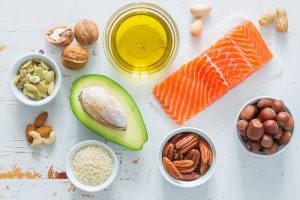by Oasis Wellness Partners on October 18, 2020

When you work hard to eat a healthy diet every day, its important to consider how much fat you’re eating and what kind. If you care about healthy eating, you have probably done some research, and have heard people talk about focusing on good fats instead of ‘bad’ fats. But what does it all really mean, and why does it matter for your health? What are healthy fats, anyway? Isn’t fat just fat?
Many people start eating a healthy diet by cutting out saturated fats and keep unsaturated fats in their diets, but it isn’t quite that simple. In general, fat has certainly gotten a bad name over the past few years. But the fact of the matter is, we all need some fat in our diet. Fat provides our bodies with energy and is one of the three main food components that our bodies require to function optimally (the others are protein and carbohydrates). Fat is also essential to help our bodies absorb vitamins and minerals. Let’s start with the good fats, why you should eat them and where you can get them.Good fats are usually liquid at room temperature (such as olive oil or flaxseed oil). These are monounsaturated. Monounsaturated fats include avocados, olive oil and sunflower oil. These plant-based fats are a big component of the Mediterranean diet and have been proven to increase heart health.
Polyunsaturated fats include omega 3 and 6 fatty acids and safflower oil and are “essential fats.” That means that our bodies need them to function but cannot make them; so we need to consume polyunsaturated fats from our diets. These types of fats help with nerve health and muscle movement. Studies have also shown that omega-3 fatty acids may help prevent stroke and heart disease. To make sure you’re getting enough, add fatty fish, walnuts, eggs, flax seeds and canola oil to your diet.
Foods rich in unsaturated fats include:
The fats to avoid are called trans fats. These fats are processed using hydrogenation—they turn healthy fats into solid form to make them last longer. Trans fats are directly linked to toxic cholesterol levels and can be found in processed foods like margarine and have been proven to increase LDL (bad) cholesterol and decrease good (HDL) cholesterol. They cause inflammation in the body, which can lead to a host of chronic diseases over time. To avoid this, read your food labels and look for “partially hydrogenated” or “trans fats”.
Lastly, saturated fats. These are not as bad as trans fats but still need to be limited in our diets. Saturated fats have been linked to high cholesterol levels and are found mostly in red meat, dairy products and egg yolks. It’s best to eat those foods sparingly. Coconut and Palm oils are also saturated–they are consiered better for the body than Trans Fats but should still be used sparingly.
As with any other food, balance is the key when it comes to consuming fats. Try to eat a variety of foods so you’ll get a good overall nutritional balance in your diet. A half of an avocado, a fried egg cooked in a half of a tablespoon of olive oil, a tablespoon of coconut oil in your smoothie, a small pat of butter on your sweet potato, some walnuts sprinkled into yogurt, a small serving of steak over salad—these are fine ways to get your daily intake of fats without overdoing it. Just remember that fat should be a small portion of your daily nutritional needs, and you will be fine.
Do you want some more help finding the right diet and lifestyle for your body? Call our Functional Nutritionist Cami at Oasis Wellness Partners to schedule an appointment to rid your body of food sensitivities and inflammation to live your best and healthiest life. (207)883-549.